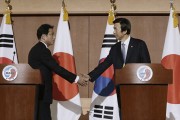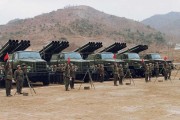Article from Yonhap News:
One Trillion Won Aegis Warship Likely to Be Detected By Enemy Because of Noise
 The photo shows South Korean Aegis warship sailing in waters.[/caption]
The photo shows South Korean Aegis warship sailing in waters.[/caption]
[Anchor]
South Korea’s Aegis warship, one of the core military assets of South Korea in establishing “Kill-Chain” and “KAMD” systems–two requisites to be fulfilled before South Korea retakes wartime operational control from the United States–is revealed to have operational problems after being deployed.
The warship, which is now in service, is known to produce the level of noise underwater that can be detected by an adversary for torpedo attacks. This is a grave defect with no methods of correction, leading to several hundreds of millions won in fines for the part supplier.
Our reporter Hwang Hye-kyoung has more.
[Reporter]
“Sejong the Great” is the first Aegis warship that our navy deployed in December 2012.
Costing a whopping one trillion won (roughly $10 billion), the state-of-the-art naval warship was found to have a grave defection three months before it was put into service. One underwater propeller on the warship has a noise level exceeding the standard.
Measured usually by two criteria, called URN (unterwater noise) and CIS (cavitation interception speed), the underwater noise, generated by Sejong the Great, resulted in unsatisfactory grades for the warship in a previous assessment of both criteria. What confounds the problem is that the same defects were also discovered in two more Aegis warships–Yeulgok Yiyi, and Seohae You Seongryong, pointing to a possible structural fault.
Underwater noise creates sound waves, providing an enemy with clues to pinpoint its existence for torpedo attacks, so warships carry deceptive bombs with similar noise levels to draw adversary attacks toward a target in place of the warships themselves. Accordingly, noise levels from warships are classified as confidential military information.
[Kim Byung-ki, editor of the Defense Times]
The louder the noise of the warship, the easier it is for the enemy to detect the warship at a distance in a short amount of time. This means we could be identified by the enemy before we can discover the enemy. A slight difference in the noise levels leads to detection at a slightly larger distance, allowing the enemy to launch an attack on us while we are unaware of the enemy’s existence.
The military authorities are reported to have glossed over the noise problem as its discovery was made just ahead of deployment in waters, while imposing four trillion won in fines on the part supplier to Sejong the Great. This passivity is in stark contrast to the Tongyoung warship which was rejected for takeover over the problematic performance of a sonar attached to it.
[Rep. Ahn Kyu-baek of the ruling Saenuri Party]
North Korea has a fleet of 77 submarines in its possession… and the East Sea is a great place to detect submarines as the sea is expansive and offers clear visibility. If we don’t resolve the noise problem, our navy could be put in great peril.
Critics in particular say that a confidentially classified noise standard for Sejong the Great was not featured in operation performance requirements and claimed that the non-inclusion caused a total $3 trillion of the Aegis project to be utilized in an haphazard way.
This is YTN Hwang Hye-gyeong.

The Sejong the Great Aegis warship failed to pass two crucial noise standard tests, raising the grim prospect of an early detection by the enemy for torpedo attacks.
Comments from Yonhap News:
drac****:
We don’t have anyone who can take good care of state affairs.
qorg****:
Whoa, somebody else must have put the money into their pocket. I have no expectations for this country. This is why people want to emigrate to another country.
wjdq****:
Military officers are playing golf at this moment.
bjk0****:
I think capital punishment is the only answer to those who commit acts of corruption in the military.
roug****:
There are so many mapias out there. [Mapia is the term referring to corrupt officials using their connections.] But I think the evilest are militarypia [a newly-coined term from military and mapia]. If there is a war, soldiers and we citizens will be powerlessly dead due to corruptions in the military.
dima****:
This case could bring about death by firing squads in China. All part suppliers and military officers responsible should be prosecuted for undermining national security. Delve further into the scandal, and set a precedent of harsh punishment as a warning for potential crimes. What a bastard!
bruc****”
An enemy attack will sink the warships in a war. Now, we are pushing the country toward a path of demise. They did a good job.
Comments from Yonhap News:
고래요:
Our enemy is not North Korea but some corrupt bastard star generals in the defense ministry.

The Sejong the Great Aegis warship failed to pass two crucial noise standard tests, raising the grim prospect of an early detection by the enemy for torpedo attacks.
We don’t have anyone who can take good care of state affairs.
Whoa, somebody else must have put the money into their pocket. I have no expectations for this country. This is why people want to emigrate to another country.
Military officers are playing golf at this moment.
I think capital punishment is the only answer to those who commit acts of corruption in the military.
There are so many mapias out there. [Mapia is the term referring to corrupt officials using their connections.] But I think the evilest are militarypia [a newly-coined term from military and mapia]. If there is a war, soldiers and we citizens will be powerlessly dead due to corruptions in the military.
This case could bring about death by firing squads in China. All part suppliers and military officers responsible should be prosecuted for undermining national security. Delve further into the scandal, and set a precedent of harsh punishment as a warning for potential crimes. What a bastard!
An enemy attack will sink the warships in a war. Now, we are pushing the country toward a path of demise. They did a good job.
Our enemy is not North Korea but some corrupt bastard star generals in the defense ministry.
굴렁쇄:
Well, that’s what they have been doing so far, I have no expectations for them. They siphoned money away and look the other way when it comes to corruption. A shoddily-build Aegis warship could bring about nuclear bomb-level damage to us.
justice:
South Korea has three Aegis warships: One is overseas to guard commercial vessels, and another one is in repair; the other one is frequently out of order, failing to show its desired performance. Aegis warships are touted as capable of detecting thousands of targets at a time, and intercepting missiles. Those in power take gains by emphasizing security, making national defense a distant dream.







